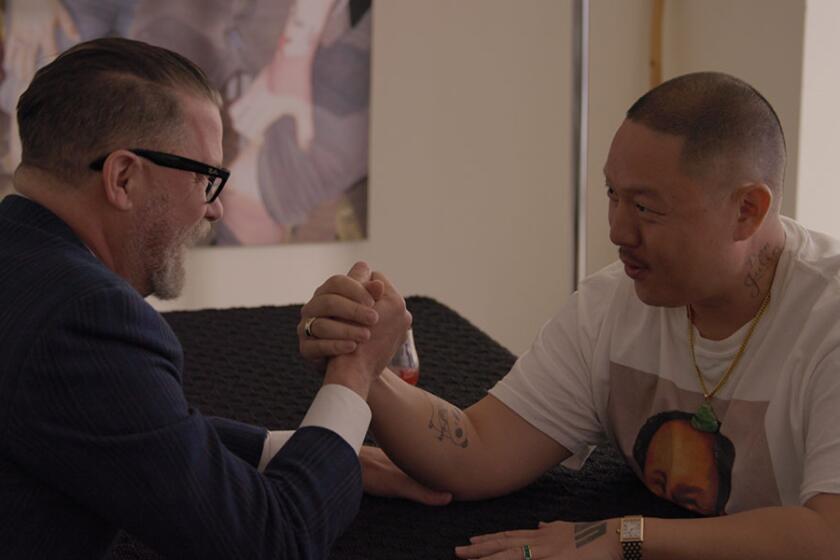MOVIE REVIEW : ‘Sure Fire’ Reveals American Character : Filmmaker Jon Jost goes beyond careful observation of behavior to understanding what drives people from within.
For 30 years independent filmmaker Jon Jost toiled in obscurity, his films never receiving regular theatrical releases. That changed in 1992 when his last film, “All the Vermeers in New York,” a poignant, romantic fable about the eternal and painful discrepancy between life and art--and of the values and instabilities of the 1980s--was released.
Now his “Sure Fire,” shot in 1988 and completed two years later, surfaces for a one-week run at the Sunset 5, where this weekend the first complete local retrospective of Jost’s films will commence. Each film will screen at 11 a.m. Saturday and Sunday through Dec. 5. Beginning Oct. 9, the series will be repeated at the Monica 4-Plex.
Jost may have a firmer grasp of the American character than any other contemporary filmmaker. He goes beyond careful observation of behavior to understanding what drives people from within. He often deals with the travails of rural or small-town men and women, but he is equally knowledgeable about the more sophisticated yet often equally troubled denizens of Manhattan, San Francisco and Los Angeles.
His style is fluid and unpretentious, not imposed from without but expressive of what’s going on inside individuals at a particular moment. To that end, however, he is not afraid to draw upon techniques of the experimental cinema in which he began, just as he allows his actors moments that can be described only as theatrical. His films seem so natural as to make you feel as if you’re eavesdropping on life as you watch them.
“Sure Fire” has a wonderfully deceptive simplicity yet evokes the dark underside of American life with the resonance of a Eugene O’Neill play. It is set in the tiny town of Circleville, Utah, where we see two 40ish men chatting over coffee at the local diner. Soon we discover how very different they are: Tom Blair’s Wes is a wiry, intense Realtor, who’s convinced himself that he can turn his economically depressed town into a magnet for prosperous California retirees. By “thinkin’ all the time,” he believes he can make himself rich. By contrast, Robert Ernst’s Larry is a weary, edgy third-generation rancher on the verge of losing everything.
Wes is willing to rescue Larry but at the price of literally owning him. What makes these two men friends at all is simply that they’ve known each other all their lives in a very small community. Wes’ wife (Kristi Hager) and Larry’s wife (Kate Dezina), realists both but filled with longing, have about had it with their respective spouses.
Tension builds for certain, but there’s absolutely nothing predictable about “Sure Fire” (Times-rated Mature for adult themes), which packs a jolt that’s totally unexpected and allows Jost to work out, in devastating metaphor, his freely admitted unhappy relationship with his own father.
Jost incorporates three Mormon texts in his film, all emphasizing the need to stick to “the straight and narrow” in God’s example yet suggesting that even then his realms may always be beyond mere mortals. Jost inspires his actors, all of whom contributed to the dialogue, to reach into themselves deeply.
While all four of his principals are impeccable, Blair is downright amazing in the way he sustains and illuminates Wes’ maddeningly manic personality. (If he weren’t so naive he’d fit right in with the equally desperate guys of “Glenngarry Glenn Ross.”) Jost throughout contrasts the uptightness of Wes and the quieter anxiety of Larry against vast landscapes, and Erling Wold’s elegiac score, performed with Peter Siegel at the pedal steel guitar, complements its every haunting moment.
For Jost series information at the Sunset 5: (213) 848-3500; at the Monica 4-Plex: (310) 394-9741.
‘Sure Fire’
Tom Blair: Wes
Robert Ernst: Larry
Kristi Hager: Bobbi
Kate Dezina: Ellen
A Strand Releasing in association with Complex Corp. presentation. Writer-director-cinematographer Jon Jost. Additional dialogue by Tom Blair, Kristi Hager, Robert Ernst and Kate Dezina. Producer Henry S. Rosenthal. Music Erling Wold. Sound design by Anthony J. Gnazzo, Walter P. O’Connor. Running time: 1 hour, 23 minutes.
Times-rated Mature (for adult themes).
More to Read
Only good movies
Get the Indie Focus newsletter, Mark Olsen's weekly guide to the world of cinema.
You may occasionally receive promotional content from the Los Angeles Times.










